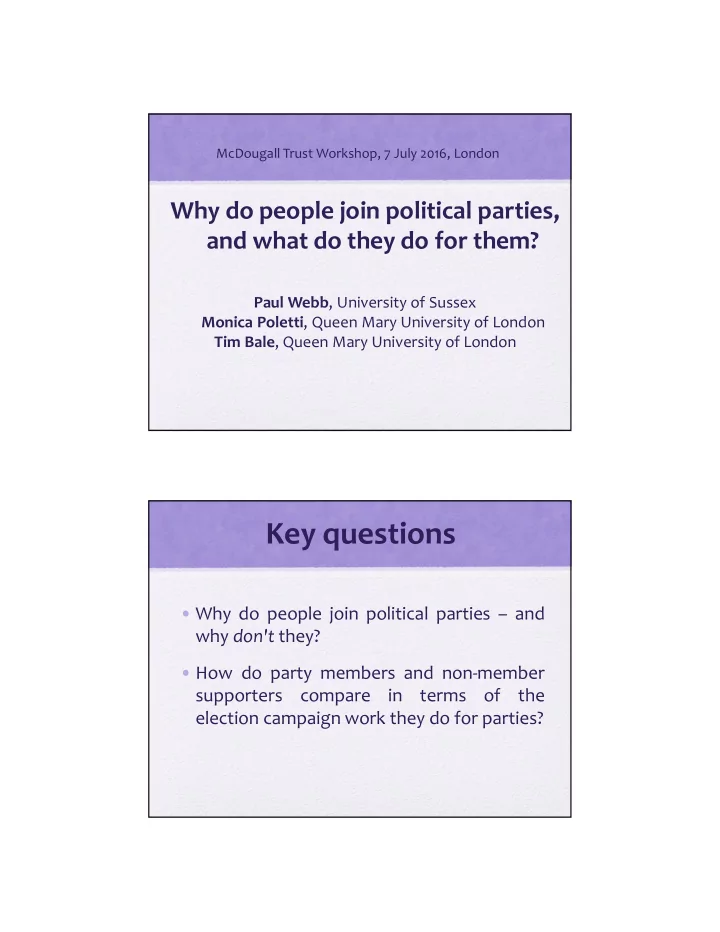

07/07/2016 McDougall Trust Workshop, 7 July 2016, London Why do people join political parties, and what do they do for them? Paul Webb , University of Sussex Monica Poletti , Queen Mary University of London Tim Bale , Queen Mary University of London Key questions • Why do people join political parties – and why don't they? • How do party members and non-member supporters compare in terms of the election campaign work they do for parties? 1
07/07/2016 The Data: Party Members Project (PMP) http://esrcpartymembersproject.org � Funded by ESRC, 2015-2018 � Involves surveys in 2015 of: � Members of 6 parties � Non-member partisans (strong party supporters) � Labour ’ s affiliated trade unionists � Survey of Labour ’ s new joiners in 2016 � Survey of party leavers in 2017 � Interviews with party officers and elites on what they want/expect of members The context: Long-run decline of party membership 2
07/07/2016 Q1: Why do some people join parties, while others don't? � Difficult to answer directly, because typically we rely on data from survey of members � These enable us to ask about factors we think might influence decision to join � But what about those people who might be expected to join parties, but do not do so? � We have asked similar questions of people such as these, and are now able to compare members and non-member supporters. So why do people join parties? Seyd & Whiteley's 'general incentives ’ model � Expressive motivations (political identity/principles) � Collective policy reasons (positive & negative) � Altruistic motivations (eg, for good of democracy or nation) � Social norms � Selective reasons (ie, personal utility) • Outcomes (eg, career advancement) • Processes (pleasure derived from involvement) 3
07/07/2016 Motivations for joining parties in 2015 But how do party members compare with non-member partisan identifiers? 4
07/07/2016 Comparing the political efficacy of members and partisans Members' and partisans' views on the costs of membership 5
07/07/2016 Have the partisans ever been members before – and would they be again? Q2: What about campaign activism: does it make a difference whether or not partisan identifiers are members? � H1. At the individual level, party members do more during election campaigns than non-member supporters � H2. At the individual level, the more ‘ intensive ’ the form of activity, the greater the gap in activism between party members and non-member supporters � H3. At the aggregate level, the overall input of non- member supporters may exceed that of party members 6
07/07/2016 Testing H1 & H2 H1. Party members do more than supporters H2. The more ‘ intensive ’ the form of activity, the greater the gap in activism between party members, supporters and trade unionists H3: At the aggregate level, the input of party supporters and affiliated trade unionists exceeds that of party members 7
07/07/2016 Conclusions General incentives model is still useful (especially collective/ expressive) � Partisans seem to think that membership might be important for � careerist reasons – to a greater extent than members themselves do Partisans are also more likely to imagine that people join because of � their social contacts than is actually the case Partisans lack political efficacy of members � Partisans see members' activism as slightly more time-consuming than � members themselves do. Nearly a quarter of partisans have considered joining up – and a fifth � reckon it would be worth it to get a vote in leadership elections. Members are more likely to participate in campaign than partisans � The more intensive an activity is in terms of time/effort, the greater the � input of members compared to partisans Overall, the impact of campaign work undertaken by partisans is at least � as great as that of members Follow us! • Web: http://esrcpartymembersproject.org • Twitter: @ESRCPtyMembers • Facebook: ESRC Party Members Project • Email: partymembersproject@gmail.com 8
Recommend
More recommend